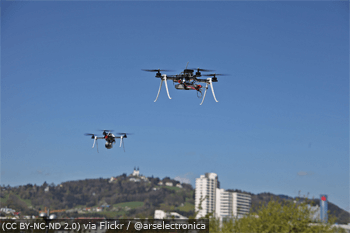Is All (Drone) Politics Local?
Page Media

The next time a cop sees a picture of you, that picture may not have been taken by a person at all. Unmanned flying drones can allow their operators to remotely - and cheaply - monitor and record individuals, groups, or locations. These drones pose significant threats to privacy when police can use them to peer into homes or track an individual's actions from afar. While law enforcement agencies around the country, including, most recently, the Alameda County Sheriff's Office, are already expressing interest in acquiring drones, the federal government has done little to address privacy concerns - hardly surprising given that Congress is just now addressing decades-old privacy issues with electronic content such as email and cloud storage. We need to consider drone privacy protections now, and that means approaching these issues at the local and state level as well as pushing for federal drone privacy rules.
Drones - unmanned and remote-controlled flying platforms - raise significant privacy concerns. Having transformed the war on terror, they are now smaller and substantially cheaper than they were just two or three years ago, and are even privately available. Drones can be used for a wide range of non-law-enforcement purposes, including tracking wildlife and conducting search-and-rescue in disaster areas. But drones can also be used specifically for surveillance purposes, making monitoring locations and people much easier than ever before. And as ACLU legislative counsel Christopher Calabrese notes, drones can be fitted with advanced cameras capable of thermal imaging, microphones, facial recognition software, and license plate readers, for starters. In other words, drones provide ample opportunity for law enforcement to collect massive amounts of data about us that officers themselves cannot. If these privacy concerns weren't worrisome enough, drones can also be weaponized.
Controversy has erupted in Alameda County in recent weeks after Sheriff Greg Ahern announced his intent to acquire a drone. We filed a public records act request that produced documents revealing Ahern intends to use a drone for surveillance and intelligence gathering purposes despite his claims to the contrary, and appeared with local advocates before the Alameda County Board of Supervisors. Without an open and democratic process and privacy safeguards, we noted, the sheriff would be free to engage in dragnet, suspicionless surveillance of area residents. On Nov. 6, the Board agreed to hold an open hearing to address those concerns, but this week we learned of a hidden agenda item seeking the approval of a grant award to the sheriff from the California Emergency Management Agency. We acted quickly and asked the Board to remove the agenda item so that no blanket approval would be given for a drone purchase without public debate. The sheriff then voluntarily withdrew his request. This change of course is good news, but it also highlights the need for continued public engagement with local government when law enforcement seeks out surveillance technology.
Local advocacy is essential because the story of federal email and data privacy suggests that D.C. policymakers and federal courts won't soon deliver drone privacy protections. Earlier this year, the FAA began to move forward with regulations for introducing nonmilitary drones into domestic airspace, and its slow-moving approach to privacy has been criticized. As this happens, Congress is just barely beginning to consider adding an e-mail and cloud data warrant requirement to the Electronic Communications Privacy Act (ECPA). A key lesson of these ECPA reforms is that they are late; we know that the use of e-mail, as well as law enforcement snooping of emails, is already commonplace. And while the federal courts have placed limits on law enforcement's ability to tap phones and place GPS trackers on cars, it is unclear when - or if - they will apply such limits to drones. We can't afford to wait until the use of surveillance drones by law enforcement is also the norm to enact robust privacy protections.
Experiences in Alameda County and other places like Seattle suggest that demanding a transparent and democratic debate at the local level is essential to obtain safeguards on drone use by law enforcement. If the glacial pace of federal privacy reforms for e-mail and data is any signal, Congress and the FAA will not put forth drone privacy protections anytime soon. This is why local communities should be active in deciding whether drones are appropriate in their communities and, if so, what limited purposes should be authorized and regulated by meaningful, enforceable and auditable safeguards. Before police drones appear in your neighborhood, join the ACLU of Northern California in encouraging local bodies such as the Alameda County Board of Supervisors to engage in a thorough and transparent debate on this emerging technology.
Matthew Cagle is a Volunteer Attorney for Technology and Civil Liberties with the ACLU of Northern California.
